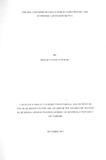| dc.description.abstract | The question whether or not government expansion causes economic growth has
divided policy makers into two distinctive theoretical camps, as proponents of either
big government or small government. Economic theory would suggest that on some
occasions lower levels of public expenditure would enhance economic growth while
on other occasions higher levels of public expenditure would be more desirable. The
objective of this research was to investigate the effects of public expenditure on the
economic growth of Kenya.
The study used a correlation design. An l l-year period between 2002 and 2012 was
selected on which the research was based. Secondary data was collected from the
Central Bank of Kenya, Kenya National Bureau of statistics, and World Bank
database website. Data was analyzed using descriptive analysis and OLS regression.
The study found that public expenditure has a strong positive effect on economic
growth. The study concludes that public expenditure in Kenya as measured by
percentage change in public expenditure for capital formation has a positive impact on
economic growth. It is recommended that the government of Kenya should focus on
promoting private investments to grow the economy and on the other hand examine
the role of trade openness as there is some evidence that rising exports may hamper
economic growth of Kenya. | en_US |

